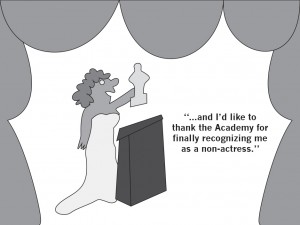
Every year, somewhere in the vicinity of 500 films are released in the United States alone whether small or major releases.
This is where the Academy of Motion Picture Arts and Sciences does its best work. It helps movies that are typically ignored by larger audiences or without the advantage of opening on 4,000 screens or more receive recognition.
Because they disregard box office performance and the disadvantages of small distribution companies, the Oscars can highlight films from a wide range of backgrounds.
This is what made the Academy Awards one of the most diverse award ceremonies in film.
But for the first time in 19 years, the Academy’s nominations are lacking in a diversity that it’s strived to maintain.
The main argument since nominations were announced Jan. 15 was Selma’s obvious snub.
Though it was nominated for Best Original Song and the most prestigious category of Best Picture, the lack of nominations in other major categories seemed odd.
While the confusion and slighted feelings are justified for Selma, it’s not a new problem. This time last year, 12 Years a Slave, written and directed by people of color reigned triumphant at the ceremony while Lee Daniel’s The Butler was shut out from the entire ceremony, somewhat unjustly.
But the bigger concern this year for the Academy Awards is the blatant snub of actors, writers, directors and films that would have featured women or people of color in those categories.
Selma director Ava DuVernay would have been the first African-American female nominated and only the fifth female director nominated in the Academy’s 87 years of history.
Angelina Jolie, director of the snubbed film Unbroken, also would have joined a highly coveted group of directors fortunate enough to be recognized by The Academy.
Maybe the biggest snub went to Gone Girl author and screenwriter Gillian Flynn, which delighted critics and had plenty of pre-Oscar buzz.
There’s usually outcries of disenfranchisement once the list of nominees are announced each year.
Industry insiders, film fanatics and movie blogs collectively wait with bated breath every year to hear who made the cut.
The only thing glaringly different is how the Academy’s nominations didn’t reflect the year in movies.
Ann Hornaday of The Washington Post said even though this year’s Oscar nominees lack diversity in both race and gender, 2014 still proved to be a highly diverse grouping of movies.
She said bold choices like nominations for Whiplash show how progressive the Academy still is. The more predictable films reveal the flipside.
The Oscars just may not be ready. It’s hard to narrow it down to just a few people and understandably so.
With all this said, the message is loud and clear: The Oscars just missed the mark this year.
Hopefully, 2015 films will head in the same direction and continue to challenge the Academy’s lack of diversity.

























